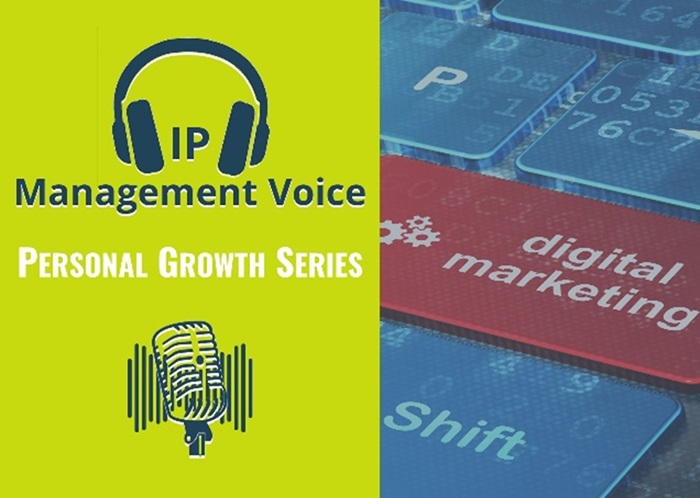From Hidden Expert to Trusted Voice: Why IP Professionals Need Digital Marketing Now
Digital marketing has become essential for IP experts to be found, trusted, and chosen in today’s global innovation economy. This post explains what digital marketing means for patent attorneys and IP consultants—positioning, educational content, visibility, and trust—not promotion. With simple steps and tools from the dIPlex’ Resource Hub, even time-pressed professionals can start building an effective online presence and connect with the clients who need their expertise most.
👉 Find here the IP Management Voice Podcast Personal Growth Series episode on digital marketing
Why Digital Marketing Is a Strategic Necessity for IP Experts
The digital landscape is transforming how expertise is found, evaluated, and trusted—and intellectual property professionals are no exception. In a recent podcast episode produced by the IP Business Academy, a crucial message emerges for patent attorneys, IP consultants, and innovation strategists: digital marketing is no longer optional. It’s become a core professional skill for standing out in a saturated, global, and highly competitive IP services market.
This post unpacks the key insights from the episode, explaining what digital marketing really means for IP experts, what it doesn’t mean, and how to approach it step by step. We also introduce practical tools available in the Resource Hub to help IP professionals take action confidently.
What Digital Marketing Is—and What It Isn’t
Digital marketing for IP professionals is not about flashy advertisements or aggressive sales tactics. It’s not about turning lawyers into influencers. Instead, it’s about visibility, credibility, and trust.
For IP experts, digital marketing means:
- Making your expertise findable when someone searches for solutions in your niche
- Building a consistent, authoritative presence across platforms like LinkedIn and your website
- Educating your target audience by sharing your perspective, insights, and problem-solving experience
- Creating a professional narrative that communicates clearly who you are, what you do, and why it matters
It isn’t about chasing attention for its own sake. Instead, it’s authority-based marketing: helping your ideal clients find you, trust you, and remember you when it matters most.
Why Digital Marketing Matters More Than Ever
There are four forces reshaping how IP professionals are discovered and evaluated:
1. Client expectations have shifted
Innovative companies today start their search for IP support online. They assess credibility through digital footprints—LinkedIn profiles, articles, videos, and websites. If you’re not visible, you’re invisible.
2. Professional credibility is increasingly built online
Clients evaluate your relevance by the insights you share. Your degrees and firm name may get you in the door, but it’s your visible expertise that earns attention and trust.
3 . The IP services market is fragmented and competitive
It’s no longer just about traditional law firms. Clients now have access to consultants, in-house experts, tech platforms, and cross-border teams. You must signal your unique value clearly.
4 . Geography is no longer a constraint
Remote work and globalization mean your next client might be on another continent. Your online presence is the bridge that connects you to them.
A Four-Part Foundation for Strategic Digital Marketing
The podcast outlines four foundational pillars for building a sustainable, impactful digital marketing presence as an IP expert.
1. Positioning and Specialization
Before producing content or updating your LinkedIn profile, you must define your niche clearly. The market favors specialists, not generalists. Ask yourself:
- What industries or technologies do I understand best?
Focusing on the sectors where you have deep insight allows you to speak your audience’s language and offer meaningful guidance. This credibility sets you apart from generalists and makes your expertise more relevant. - What specific client problems do I solve well—and enjoy solving?
Identifying the challenges you handle most effectively helps define your unique value proposition. When you enjoy solving these problems, it also fuels more authentic, engaging communication. - What challenges do I keep encountering in my day-to-day work?
Recurring client issues are strong indicators of where your expertise is most in demand. These patterns provide ideal topics for content that resonates and builds trust.
The outcome is a positioning statement that acts as your North Star. Instead of saying, “I’m an IP lawyer,” say, “I help medical device companies translate complex innovations into defendable European patent strategies.” This sharp clarity guides all your outreach.
2 . Value-Based Educational Content
Once you’ve established your positioning, you need to communicate it consistently by sharing content that builds trust. Content that works in IP isn’t about flashy claims—it’s about making complexity understandable and actionable.
Examples include:
- LinkedIn posts that answer real client questions
Addressing actual client questions on LinkedIn shows that you understand their concerns and can provide practical guidance. These posts build trust by demonstrating that your expertise is rooted in real-world experience. - Blog articles on trends, decisions, or practical IP scenarios
Well-written blog posts help clarify how legal or market developments impact your clients’ They position you as someone who not only understands the law but also its strategic implications. - Explainer videos or checklists for common challenges in your niche
Short videos or checklists make complex topics more accessible and actionable for your target audience. They are easy to share and help your audience see the value you bring in solving their day-to-day IP challenges.
The key is showing how you think. Your content becomes the stage on which your expertise performs—quietly, consistently, and helpfully.
3 . Platform Focus and Consistency
You don’t need to be on every platform. You just need to be present where your audience actually looks for expertise—usually LinkedIn and your own website.
LinkedIn helps establish visibility and thought leadership. Your website acts as the digital home where people can explore your full offering. Industry publications or webinars can extend your reach, but consistency is what matters most. That means:
- A uniform tone of voice and visual identity
A consistent tone and look help build recognition and reinforce your professional credibility. When your audience encounters your content, they should immediately sense it’s from the same trusted expert. - Core messages that don’t change from one channel to the next
Your positioning and key messages should be the same whether someone reads your LinkedIn profile, visits your website, or hears you in a webinar. This clarity reduces confusion and strengthens your reputation in your niche. - A repeatable rhythm of activity—even if light at first
You don’t need to publish daily, but a steady pace creates reliability and keeps you top of mind. Even one quality post per month helps build momentum and audience trust over time.
This coherence builds recognition and trust. Inconsistent messaging creates friction and makes you harder to remember.
4 . Searchability and Digital Footprint
Even the most insightful content can go unnoticed if it’s not discoverable. You don’t need to master complex SEO (Search Engine Optimization), but you do need to ensure that your expertise can be found when someone is actively looking.
This means:
- Using the language your clients actually use to describe their problems and goals
Speaking in your clients’ terms makes your content easier to understand and more relatable. It also increases the chances that your expertise appears in their online searches. - Optimizing your LinkedIn profile with those client-centered keywords
A clear, keyword-rich headline and summary help LinkedIn’s algorithm—and potential clients—understand exactly what you offer. This makes you more visible when someone searches for help in your specific niche. - Structuring your website content around the problems you solve
Your website should focus less on your credentials and more on how you address client pain points. Organizing content this way makes it easier for visitors to see the value of working with you. - Ensuring a Google search of your name points to your niche and qualifications
Your digital footprint should confirm your credibility and specialization within seconds. When someone googles your name, they should find content that reflects your authority and relevance.
If clients can’t find you online when they need your expertise, you’re missing opportunities for impact and connection.
Common Barriers—And How to Overcome Them
The podcast also explores the mental and practical challenges IP professionals often face when approaching digital marketing.
“I’m not a marketing person”
Reframe the task: you’re not doing marketing; you’re providing clarity to a wider audience. Your online content is simply an extension of the helpful explanations you already give clients every day.
“I don’t have time”
Start small. One post a month, one blog per quarter, or repurposing internal presentations into public insights. Record voice memos when ideas strike and write later. Batch tasks when you can. Progress is more important than perfection.
“I don’t know what to say”
Use everyday prompts like:
- A common client question I get is…
- What people often misunderstand about…
- How a recent change in regulation affects…
You don’t need to be groundbreaking—just helpful and relevant.
“I feel self-promotional”
Shift the focus from yourself to your audience. Instead of saying, “We won a big case,” say, “Here’s what companies in this field can learn from a recent decision.” You share knowledge, not boast.
“I don’t know which tools to use”
Start with the essentials:
- A professional LinkedIn profile
- A simple website or landing page
- A content calendar with quarterly themes
- Only expand into more tools (e.g., email platforms, schedulers) once your core strategy is consistent and working.
How the Resource Hub Can Help
The IP Business Academy’s Resource Hub provides structured tools to guide your digital marketing journey. These are not generic templates—they’re specifically designed for IP experts navigating business development challenges.
In the Resource Hub, you’ll find:
- A Growth Suite for IP Experts that includes roadmaps for developing a niche and content plan
- An Email Course that helps identify your personal business development style
- Self-assessments to evaluate where you are and what steps to take next
- Practical products like checklists, frameworks, and positioning tools tailored to the IP industry
All resources are crafted with one goal: helping you go from hidden expert to visible authority—without sacrificing your professional standards.
Explore the full support here:
👉 https://profwurzer.com/resource-hub/
From Expertise to Visibility
Digital marketing is not a distraction from your core work as an IP expert. It’s the bridge that connects your deep competence with the people who need it most. It’s how you ensure your knowledge doesn’t remain hidden—but instead contributes actively to the innovation economy.
It’s about positioning, not promotion. Education, not advertising. Thought leadership, not traffic chasing.
Start small. Stay consistent. Use your daily work as fuel for your digital voice. And if you need guidance, the Resource Hub is designed to support you every step of the way.
The time to act is now—because if your expertise is invisible online, innovation opportunities may be passing you by.



